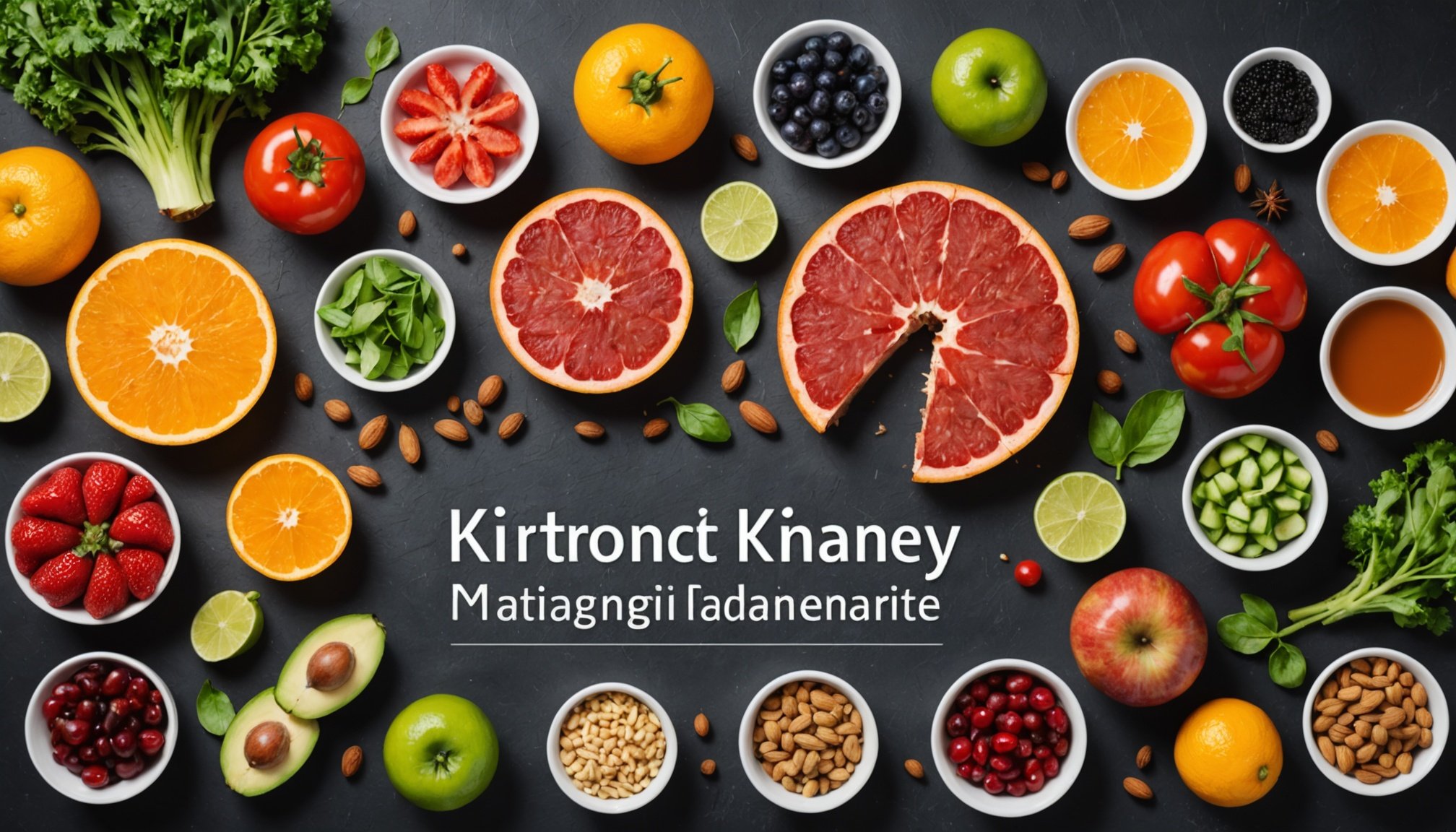Overview of Chronic Kidney Disease Management
Chronic Kidney Disease (CKD) is a progressive condition characterized by the gradual loss of kidney function. It is classified into stages, based on the glomerular filtration rate (GFR), ranging from stage 1 (mild) to stage 5 (end-stage renal disease). Understanding these stages is critical for effective CKD management.
Lifestyle factors play a crucial role in managing CKD. Choices such as maintaining a healthy weight, exercising regularly, and avoiding smoking can positively impact the disease’s progression. They also help in controlling blood pressure and blood sugar levels, which are significant in slowing down CKD development.
Also read : Exploring the Impact of Smartphone Apps on Heart Rate Variability Tracking for Enhanced Anxiety Management
Nutritional strategies are central to CKD management, as they can prevent progression and reduce complications. A diet low in sodium, protein, and phosphorus, combined with adequate intake of fruits and vegetables, supports kidney health. Monitoring mineral and electrolyte balance is equally essential, as it helps in maintaining proper kidney function without overburdening the organs.
Incorporating these lifestyle and nutritional strategies into daily routines empowers individuals to take control of their health and potentially slow the progression of Chronic Kidney Disease.
Topic to read : Unlocking Recovery: The Role of Occupational Therapy in Healing Traumatic Brain Injuries
Nutritional Strategies for Chronic Kidney Disease
Successfully managing Chronic Kidney Disease (CKD) requires careful nutritional planning. Dietary interventions like creating customized meal plans can play a vital role in maintaining kidney health.
Low-Protein Diets
Limiting protein intake can help reduce the workload on the kidneys. Protein restriction slows the progression of CKD by decreasing protein waste products that need to be filtered. Clinical research supports limiting proteins to delay dialysis onset and improve patient outcomes. Tips for implementing a low-protein diet include choosing plant-based proteins and consulting a dietitian to create a balanced meal plan.
Sodium and Fluid Management
Excessive sodium can exacerbate CKD by increasing blood pressure and fluid retention. For optimal kidney function, limit sodium intake to less than 2,300 mg per day. Fluid intake should be monitored closely, as CKD can impair the body’s ability to manage water balance. Practical strategies include reading food labels for sodium content and using herbs and spices instead of salt.
Monitoring and Adjusting Nutritional Needs
Individualized nutrition plans are essential. Dietitians play a crucial role in CKD management by tailoring dietary interventions to each patient’s needs and regularly assessing nutrient requirements. Adjusting meal plans is necessary when patients’ conditions or responses to treatment change. Regular assessments help maintain health and prevent further kidney damage.
Key Nutrients Affecting Kidney Health
In exploring the role of essential nutrients in maintaining kidney health, it becomes crucial to examine certain micronutrients in a kidney-friendly diet. Phosphorus and potassium are two nutrients that especially impact kidney function. While phosphorus is necessary for bone health and cellular repair, excessive phosphorus can strain the kidneys, needing careful management. Similarly, potassium is vital for heart function; however, high levels can be detrimental to those with adverse kidney conditions.
Omega-3 fatty acids play a significant role by reducing inflammation, hence easing the strain on kidneys. Their rich presence in fish oils and flaxseeds makes them beneficial without overwhelmingly burdening the kidneys. In managing Chronic Kidney Disease (CKD), they exhibit protective properties, helping to maintain kidney function.
Antioxidants and vitamins further round out a kidney-friendly diet by providing essential support. These nutrients help combat oxidative stress, a common concern in CKD. Vitamins C and E, along with beta-carotene and selenium, offer protective benefits, mitigating inflammation and promoting overall renal health. Thus, a balanced intake of specific nutrients can aid in supporting and preserving kidney function effectively.
Evidence from Research Studies
Recent clinical trials have significantly advanced our understanding of the role nutritional therapy plays in managing Chronic Kidney Disease (CKD). Studies suggest that dietary interventions, tailored to individual needs, show promising effects on clinical outcomes. CKD studies focusing on plant-based diets and reduced protein intake indicate potential benefits, such as slowing disease progression and enhancing patient quality of life.
Leading nutritional therapy research has reinforced these findings by demonstrating marked improvements in kidney function and metabolic health through strategic dietary changes. Key outcomes from these trials include reduced risk of dialysis and lower mortality rates among CKD patients who adhere to specific nutritional guidelines.
However, current research does come with limitations. Many studies have small sample sizes, and the diversity of CKD’s manifestations necessitates broader trials to validate these findings across different populations. Future research should aim to overcome these constraints, exploring a wider array of dietary approaches and their long-term impacts on clinical outcomes.
In summary, while the evidence is compelling, more comprehensive research is needed to fully understand and optimise the benefits of nutritional therapy for CKD patients.
Patient Case Studies and Testimonials
Exploring patient experiences with chronic kidney disease (CKD) can illuminate the path to better health. Personal stories serve as powerful CKD success stories, showcasing the profound impact of nutrition.
One patient, diagnosed with CKD, embraced a plant-based diet rich in fruits and vegetables. This change led to noticeable improvement in kidney function and overall well-being. Through this approach, the nutritional impact proved crucial, reducing proteinuria and stabilising blood pressure levels.
Another testimonial highlights the importance of a low-sodium dietary intervention. Over time, the patient experienced a decrease in blood pressure, leading to reduced medication reliance. The combination of medical advice and nutritional adaptation emerged as key in their success.
These first-hand accounts convey valuable lessons, notably the significance of tailored dietary plans. Patients often report heightened energy levels and improved quality of life with appropriate dietary adjustments. Additionally, support from dietitians plays a significant role in their journey toward better health.
Patient narratives emphasise the critical role of trust in healthcare providers and dedication to lifestyle changes, offering real-world evidence of nutrition’s power in managing CKD effectively. By heeding these lessons, individuals can pave their way to sustaining kidney health.
Practical Recommendations for Implementation
Developing effective strategies for Chronic Kidney Disease (CKD) through dietary guidelines can significantly enhance clinical practice and improve patient education outcomes. Addressing CKD involves tailored nutrition plans that cater to individual needs, ensuring that patients can adhere to a diet that aligns with their health goals.
Creating a Kidney-Friendly Meal Plan
Designing a meal plan for CKD involves understanding the essential components of a balanced CKD diet. Foods that are low in sodium, potassium, and phosphorus are crucial, as these help manage kidney function. Consider sample meal plans that accommodate different stages of CKD, focusing on the balance between macronutrients and specific dietary needs. Tips for planning meals should take into account food preferences, lifestyle habits, and potential dietary restrictions to enhance adherence to the plan.
Resources for Patients and Healthcare Professionals
Access to educational materials and tools is pivotal in CKD management. These resources include dietary guidelines, pamphlets, and online tools designed to assist both patients and healthcare providers. Community resources, such as support groups and workshops, can provide additional support and insight into effective dietary interventions. Continuous education is essential in keeping up with evolving nutritional strategies for CKD, ensuring that both patients and healthcare professionals remain informed and proactive in managing the condition.











